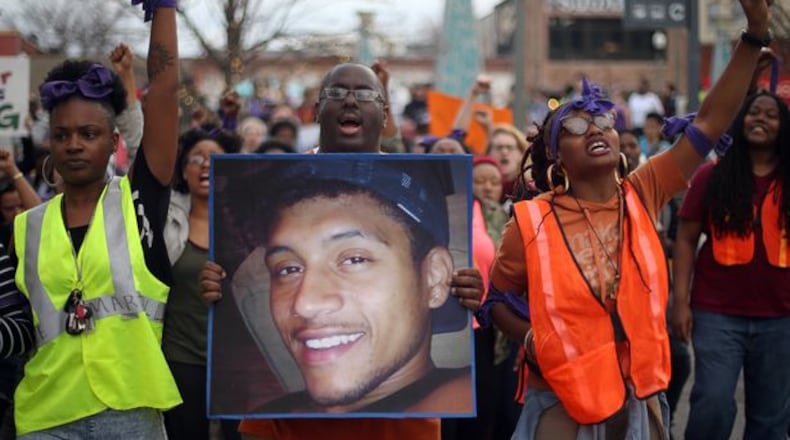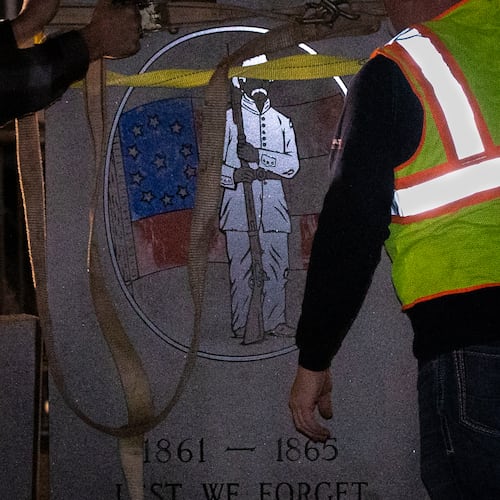Like many of the unintended victims who died at the hands of local police officers in 2016, U.S. Air Force veteran David Powell had no criminal record and was not suspected of any crime.
And, as with the other controversial cases, the officer who shot Powell has been fully exonerated.
Maybe he should’ve been. A Henry grand jury thought so, concluding late last week that Henry County Police Sgt. Patrick Snook was justified in shooting Powell, who was armed, because Snook feared for his life and the lives of his fellow officers. Even Keith Martin, the lawyer for Powell’s family, said he doesn’t know whether charges were warranted.
Yet Martin said the system that cleared Snook, who had been dispatched to the wrong address, was neither transparent nor comprehensive, a complaint shared by many of the families who lost loved ones in controversial police actions.
“It’s really hard to get a grand jury indictment (of a police officer),” said attorney Chris Stewart. Stewart represented the families of Chase Sherman, a Destin, Fla., man, who was killed by two Coweta County deputies after his family called 911 for help; and Bobby Daniels, a Navy veteran and CNN Center security guard shot dead by Douglas County police as he tried to calm a troubled son.
Separate grand juries ruled charges were not warranted for the officers involved.
“It’s beyond frustrating,” said Stewart, who also represented the family of Walter Scott, the Charleston man fatally shot in the back by a police officer. Last week, that officer was freed after a mistrial was declared in his case, a shocking development for many since the shooting was captured on video.
Stewart was in the courtroom and still can’t believe Michael Slager, the officer charged in the shooting, was not convicted. He said Slager’s lawyer told the jury that a conviction in this case would reflect poorly on all of law enforcement.
Police officers have always been given the benefit of the doubt, and they appear to have a new ally in Donald Trump, who ran on a platform calling for an end to the “war on cops” and for a crackdown on violent crime.
2016 has proven to be an especially dangerous year for police. There has been a 66 percent increase nationwide in the fatal shootings of officers from this same time in 2015, said Steve Groeninger of the National Law Enforcement Officers Memorial Fund. So far 63 officers have been gunned down in the line of duty this year. No more than 50 officers have been fatally shot in any one year since 2011.
The public is loath to prosecute police officers, and so are the district attorneys who bring these charges before a grand jury, said Mawuli Davis, who has represented victims’ families in several such cases. He advocates the formation of independent agencies to investigate and then prosecute shootings by police.
“The lack of transparency in these cases is troubling,” said Davis, who represented the family of Kevin Davis, a DeKalb County man shot in his apartment after calling 911 for help. “There’s so many opportunities for the system to not address what seems so apparent to most of us.”
An investigation by The Atlanta Journal-Constitution and WSB-TV last year showed that, of more than 180 fatal shootings over five years by police officers in Georgia, none had resulted in criminal charges against the officer.
Indeed, a DeKalb County grand jury’s murder indictment of Officer Robert Olsen this year was the first such charge in memory. Olsen was accused in the death of Anthony Hill, who was walking naked outside his apartment building when Olsen responded to a call about him. Olsen’s trial has not been scheduled.
The AJC/WSB investigation resulted in a new law in Georgia that changed the way officers are treated by grand juries. Formerly, police were allowed to attend every minute of a grand jury proceeding concerning them and then were permitted to make a statement at the end of that proceeding — a statement that could not be challenged or questioned by anyone. Under the new law, officers may not attend the full proceeding and, if they choose to make a statement, may be cross-examined by prosecutors.
The state’s district attorneys successfully opposed a part of the bill that would’ve appointed special prosecutors to replace them in prosecuting fatal police shootings. But other elements of House Bill 941 passed, including a requirement that counties provide transcripts of the secret proceedings and make them available to the public.
Martin said he is eager to get his hands on the transcript of Snook’s grand jury hearing. He doesn’t believe the jury heard all the evidence, considering that Powell’s wife, the only civilian witness to her husband’s shooting, was never called to testify.
“We are less concerned with the grand jury decision than we are with the facts of what happened,” Martin said.
Powell’s widow disputes the officer’s contention that they identified themselves as police. Her husband thought the police were burglars, Martin said.
He was awakened by his dogs. He then saw a shadowy figure outside his laundry room window. He armed himself and opened his garage door. Three shots were fired, all by police.
Henry District Attorney Jim Wright said the grand jury listened to two statements Sharon Powell gave to the GBI so her testimony was not needed. The case is now closed, he said.
About the Author
The Latest
Featured


